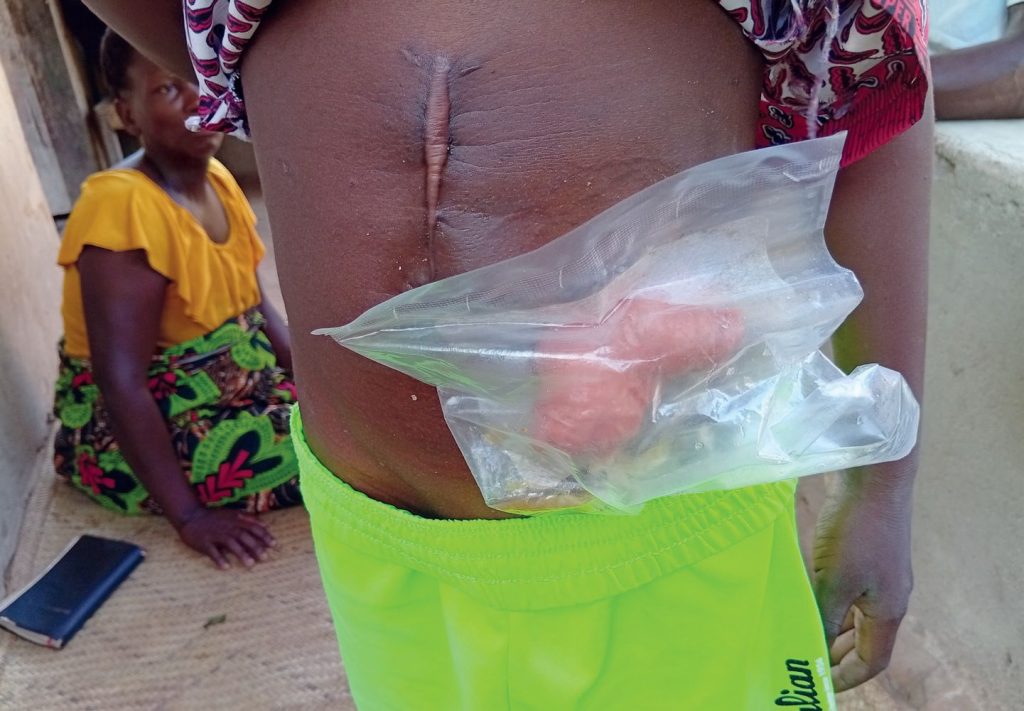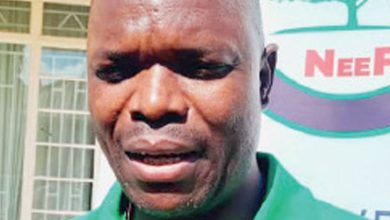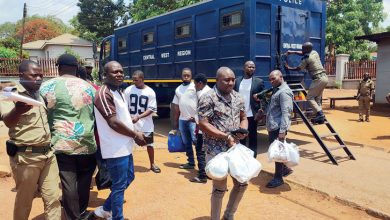Bullet tears apart nine-year-old’s childhood
Nine-year-old Davie Sichali’s life was brutally shattered when a live bullet, allegedly left behind by soldiers after training near Chilumba Barracks in Karonga District, exploded and ripped through his stomach.
Playing with other children near the forest reserve used by the Malawi Defence Force (MDF) for military exercises, Davie and his friends found scattered bullets. In a moment of fatal curiosity, they placed one on a fire.

The resulting blast pierced his stomach and severely damaged his intestines, leaving them shockingly exposed.
Four months later, the young boy’s destitute family is desperate for life-saving help and demanding accountability as Davie now lives with his intestines partially exposed, using stoma bags to urinate and defecate, enduring daily pain, and restricted to soft foods
According Eflida Tchuwa, Davie’s heartbroken grandmother and guardian, the tragedy occurred in Chigwazani Village in Senior Chief Wasambo’s area that borders Chilumba Barracks.
She explained in an interview this week the boy was rushed by family and neighbours to St Anne’s Hospital at Chilumba Trading Centre where medical personnel stabilised him temporarily.
The severity of his injuries, however, required urgent transfer to Chilumba Barracks Hospital.
“Due to the critical nature of his injuries, Davie was then referred to Karonga District Hospital and later admitted to Mzuzu Central Hospital for specialised surgical treatment and recovery,” Tchuwa told Nation on Sunday.
After two weeks treatment, he was discharged and now lives with his intestines partially exposed, enduring daily pain, eating only soft foods, while his family struggles emotionally, socially and financially to meet basic medical needs.
He cannot normally visit the toilet as he uses stoma bags placed on the protruding intestines to urinate and defecate.
Despite the life-threatening condition, Davie’s family feels abandoned because military authorities have never visited the boy or provided any support.
The family’s appeals for assistance have been met with indifference and bureaucratic delays from authorities at the military base.
This has left Davie’s uncle, Mwiza Tchuwa and the grandmother, to toil for the boy’s special meals and medical requirements.
The grandmother claimed a medical officer at Chilumba Barracks advised them to seek stoma bags and further care at Karonga District Hospital, a distance of over 70kms.
“But no transport, no financial support or guidance was provided, compounding our struggles,” bemoaned Tchuwa.
At Karonga District Hospital, she claimed, they were told to purchase the stoma bags privately, each costing K15 000, which is an impossible expense for the family.
Tchuwa said a follow-up at Mzuzu Central Hospital is scheduled for November 4 2025, but she is not sure if they will fulfil it because of logistical and financial challenges.
Catholic Commission for Justice and Peace (CCJP) Karonga Diocese and Karonga Civil Society Organisations Network (Kacson) have since expressed shock and demanded investigation into the incident.
The organisations have urged government to provide financial, material and medical support to the family to ensure Davie’s health and well-being are prioritised without delay.
They have called upon Malawi Defence Force (MDF) authorities to institute an investigation on the incident and take corrective action to help the family seek justice and compensation.
In an interview, Karonga Diocese CCJP desk officer Obert Mkandawire said they have tried to engage MDF on the issue both at regional and headquarters level.
“Even Davie’s family faced a similar problem at Chilumba Barracks. It has been frustrating to get feedback from a closed institution such as MDF,” he said.
He said CCJP is considering engaging the Ministry of Defence to investigate the matter .
“We will also engage the Malawi Human Rights Commission [MHRC] to investigate the human rights violations suffered by Davie and seek pro bono lawyers to represent the family to seek damages from government and MDF if the latter does not take responsibility for the injury,” lamented Mkandawire.
Kacson chairperson Edgar Phiri said they want authorities to take action.
“Transparent handling of the case will build public confidence in both the MDF and government’s commitment to justice and safety,” he said.
Phiri also said they want MHRC to probe the issue as a human rights one.
MDF spokesperson Lieutenant Colonel Paul Chiphwanya did not pick his call when contacted.
Commenting on the matter, a specialist surgeon from Queen Elizabeth Central Hospital in Blantyre said if the stoma (the place where the intestines protrude) is left without a colostomy bag or cloth to keep the intestine moist it could lead to other complications.
She said during the operation, surgeons may have put a standard colostomy to allow the damaged bowels to heal properly.
“Generally, they are reversed or put back inside after sometime, but some unlucky victims have them for life. But this depends on the damage,” she said.
Centre for Human Rights and Rehabilitation (CHRR) executive director Michael Kaiyatsa described Davies’ condition as heart-breaking and raises serious human rights concerns about children’s protection as well as the duty of the State to provide redress when its agents cause harm.
He said: “The fact that a live bullet caused such a devastating injury shows a failure in ensuring the safety and security of civilians, particularly children. This incident demonstrates negligence in handling dangerous military materials, endangering lives within a civilian area.”
Kaiyatsa said silence or inaction by the MDF was worrisome, undermines public trust and represents institutional neglect of a child victim of State-related harm.
“MDF has the legal and moral responsibility to investigate the incident thoroughly, transparently and to provide immediate and adequate medical, psychosocial financial support to Davie and his family,” he said.





